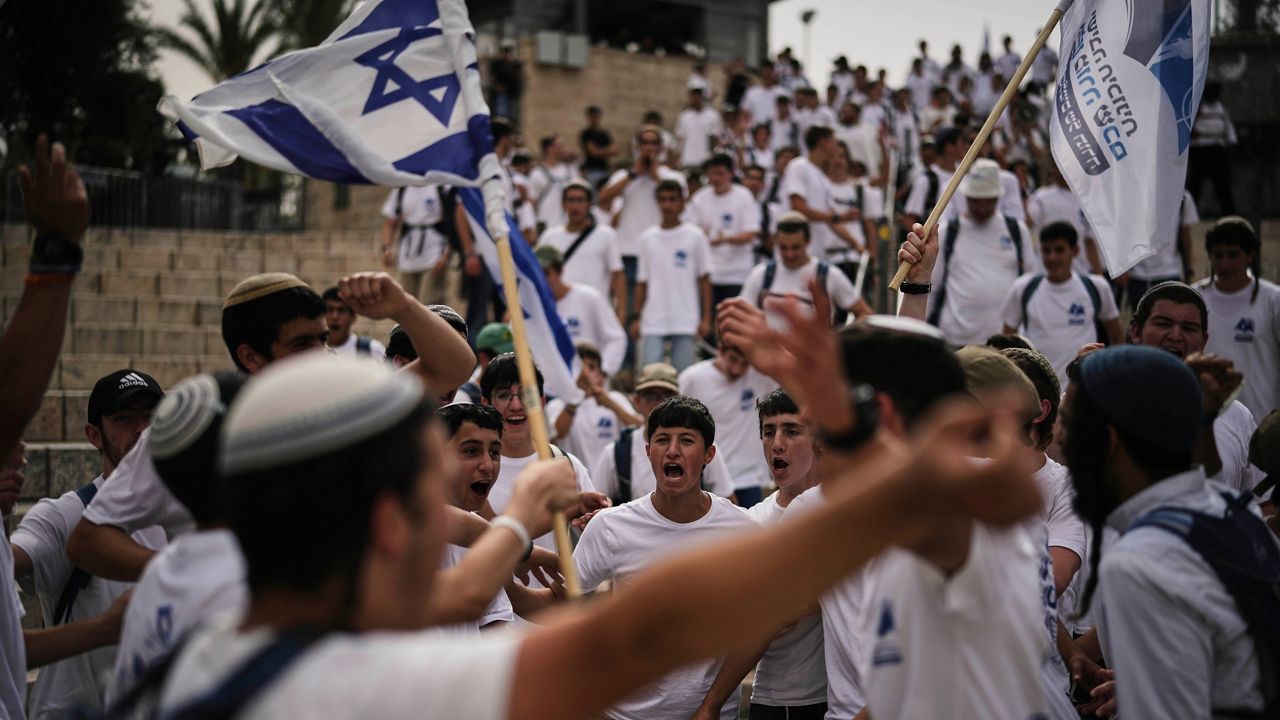Chanting slogans like “Death to Arabs” and “May your village burn,” groups of young Israeli Jews marched through Muslim neighborhoods in Jerusalem on Monday, May 26, 2025, during the annual Jerusalem Day procession.
The Associated Press reports that the event commemorates Israel’s 1967 capture of east Jerusalem during the Six-Day War, including the Old City and its religious sites, which are sacred to Jews, Christians, and Muslims.
The march is known for its ultranationalist tone and often stokes tensions between Israelis and Palestinians.
Palestinian shopkeepers closed early in anticipation of the procession, and Israeli police heavily patrolled the area.
At one point, a police officer was seen embracing a marcher in celebration.
With temperatures soaring to 98°F (37°C), the crowd sang, danced, and jumped as they made their way through the narrow streets.
Earlier in the day, a small group of protesters, including an Israeli member of parliament, stormed a United Nations compound in east Jerusalem that belongs to the U.N. agency for Palestinian refugees, UNRWA.
The compound has been largely unused since January, when UNRWA staff were told not to work there for safety reasons.
The U.N. says the site remains protected under international law.
The Jerusalem Day march has previously provoked violence.
Last year, during the first year of the war in Gaza, ultranationalist participants assaulted a Palestinian journalist and called for violence against Palestinians.
In 2021, the march was a flashpoint that helped ignite an 11-day war in Gaza.
This year, as tensions remain high after nearly 600 days of war in Gaza, the march again raised concerns of escalating conflict.
Buses brought hundreds of young ultranationalist Jews from across the country, including settlements in the Israeli-occupied West Bank, to participate in the march.
After the event ended, Palestinian shopkeepers returned to find their storefronts vandalized with stickers that read “Gaza is ours.”
Some began cleaning their shops while volunteers from peace groups like Standing Together and Free Jerusalem positioned themselves between marchers and residents.
This is supposedly in an attempt to prevent confrontations.
One Palestinian shopkeeper swept bay leaves from the ground after his supply was overturned by marchers.
A group of young Israelis followed a Palestinian woman, shouting insults, including the Arabic slur “charmouta.”
A protester shouted, “This is our home, this is our state,” to which the woman responded in Hebrew, “Go away from here!”
Israeli police, who referred to the event as the “Dance of Flags,” said they detained several people and acted swiftly to prevent violence.
Prime Minister Benjamin Netanyahu delivered a speech from an archaeological park in a Palestinian neighborhood of east Jerusalem.
He pledged to preserve the city’s unity and maintain Israeli sovereignty.
He also stated that the government is urging foreign embassies to recognize Jerusalem as Israel’s capital and is investing billions of shekels into its development.
Israel considers all of Jerusalem to be its undivided, eternal capital, but this claim is not internationally recognized.
Palestinians view east Jerusalem as the capital of a future independent state, making the city a central and emotionally charged issue in the Israeli-Palestinian conflict.
Meanwhile, Israel’s far-right National Security Minister Itamar Ben-Gvir visited the contested hilltop compound in east Jerusalem.
It reportedly houses the Al-Aqsa Mosque and the Dome of the Rock – Islamic sites revered by Muslims, and the Temple Mount, a sacred location for Jews.
Traditionally, a fragile arrangement has allowed Jewish visitors to enter the site but not pray there.
This “status quo” has been in place since Israel captured the site in 1967.
However, Ben-Gvir openly declared that this arrangement is changing.
“Today, thank God, it is possible to pray on the Temple Mount,” he said.
His statement contradicts the official position of Prime Minister Netanyahu’s office, which insists there has been no change to the agreement.
Police confirmed that Monday’s Jerusalem Day march would not enter the compound.
Ben-Gvir’s visit, along with that of other lawmakers and activists, comes amid increased Jewish presence on the site.
The activist group Beyadenu reported that dozens of Jewish visitors, some carrying Israeli flags, entered the area and prayed, acts that Palestinians view as provocative.
In the past, such visits have sparked widespread violence.
Hamas, for instance, cited perceived violations of the site’s sanctity as part of its justification for launching the October 7, 2023, attack on Israel.
Later in the day, around a dozen Israeli demonstrators, including lawmaker Yulia Malinovsky, who helped pass a law banning UNRWA, climbed over the gate of the U.N. compound in east Jerusalem.
They displayed a banner demanding that the area be converted into an Israeli settlement.
Last year, Israel’s housing minister announced plans to explore reclaiming the site for residential use.
Israel accuses UNRWA, Gaza’s primary aid provider, of being infiltrated by Hamas, a claim the U.N. strongly denies.
There was no immediate response from Israeli police regarding the intrusion into the compound.







